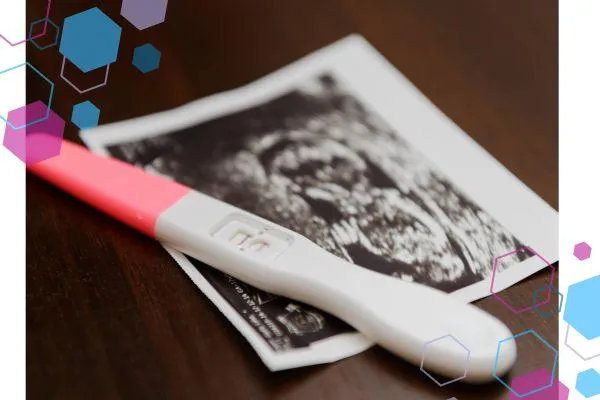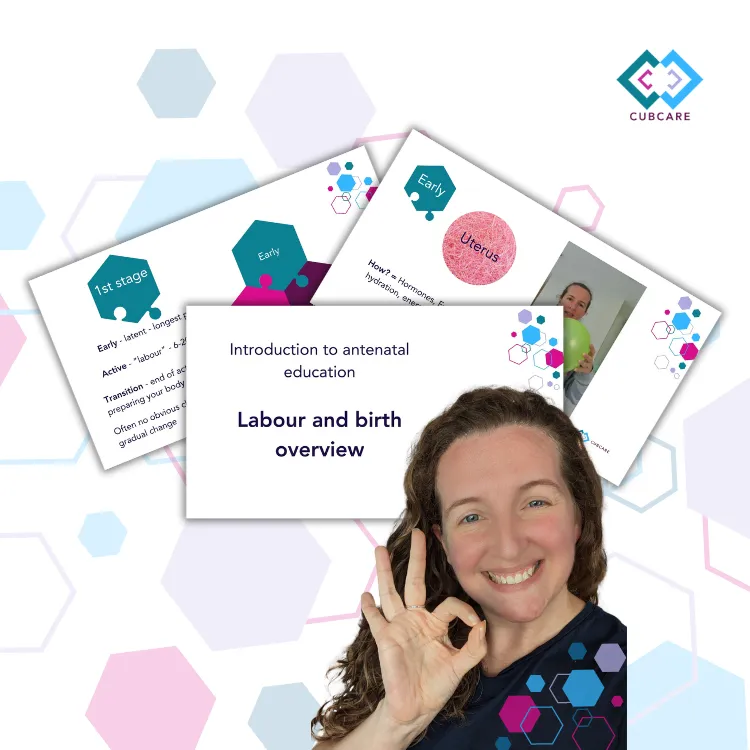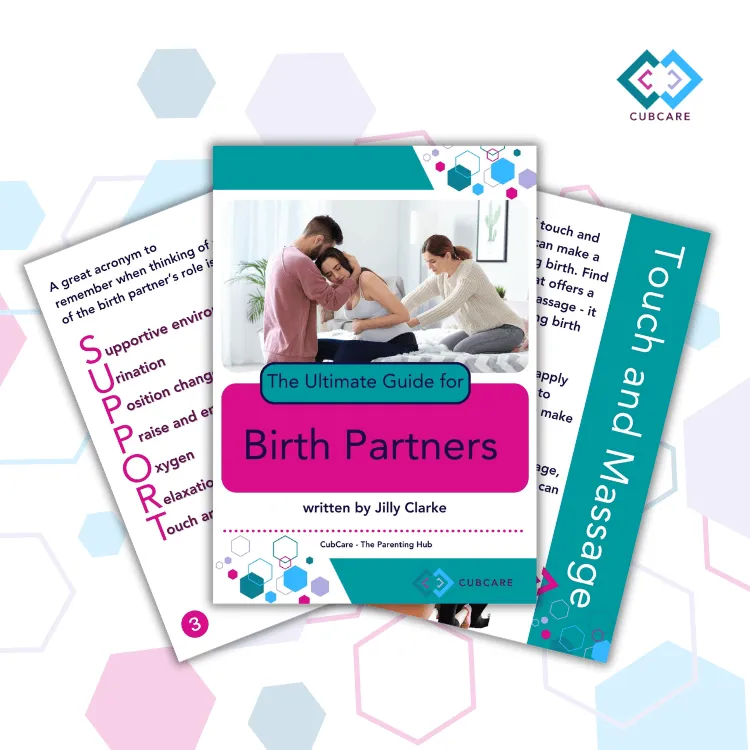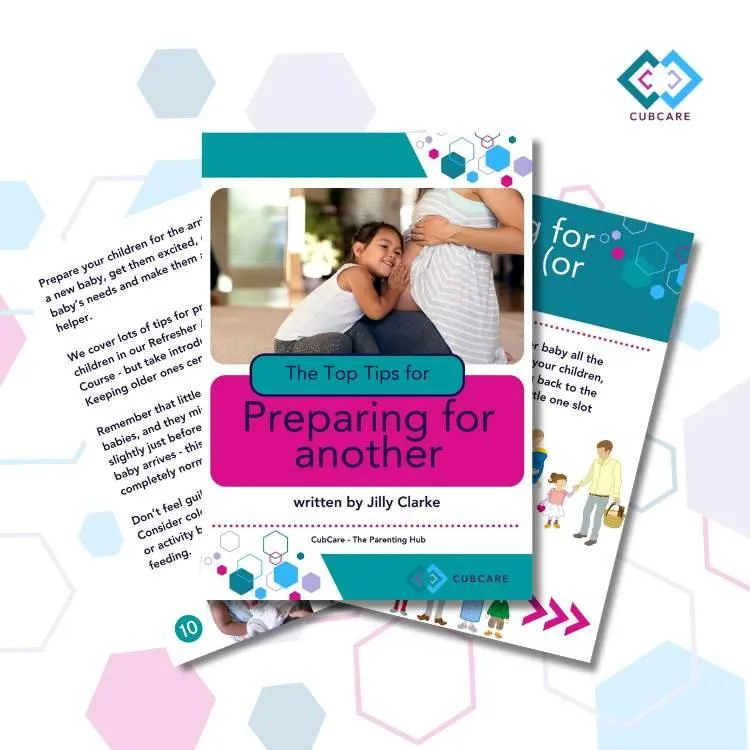CubCare blogs.
From early pregnancy to newborn development.
Advice to help through pregnancy, birth and childhood.
BLOG

Top 10 Early Pregnancy Questions Answered by an Expert
"I remember that first trimester of pregnancy was so lonely. There were so many conflicting emotions, so many physical symptoms. I created the Early Pregnancy course to help everyone start off with intention, instead of chaos." - Jilly Clarke
The moment you find out you’re pregnant, the questions begin.
Whether you’re overjoyed, overwhelmed, or quietly terrified (or all three), early pregnancy comes with a thousand questions — and not nearly enough answers. You might be five weeks pregnant, wide awake in the middle of the night, scrolling forums or symptom checklists, wondering if what you're feeling is normal.
And that’s the problem: the first trimester can be so quiet when it comes to real support.
I’ve been an antenatal educator and doula since 2014, and I’ve seen the same early worries come up again and again. So, in this post, I’m answering the questions you might be googling in secret — with straight-talking, evidence-based reassurance.
Let’s get into it.
Is extreme tiredness normal in early pregnancy?
Yes — and it’s not just “tired,” it’s bone-deep exhaustion. In the first trimester, your body is producing new hormones, increasing blood volume, growing not just a human but another organ for you too, using more energy, using up important nutrient stores, building the placenta and adapting to pregnancy in ways that aren’t always visible. You might feel like you’ve run a marathon just getting out of bed.
Rest as often as you can. And don’t feel guilty if your usual routine just isn’t doable right now. By the end of the first trimester, you’ve grown a whole human AND moved your insides about entirely.

What does constant nausea mean in early pregnancy?
Nausea is very common in early pregnancy and the first trimester, and some say it correlates with healthy hormone levels. But absence of nausea doesn’t mean something’s wrong.
Everyone's experience is different — from mild morning nausea to full-blown hyperemesis gravidarum (HG), a more sensitive gag reflex, or food aversions. You might feel travel sick, or be sick at the slightest hint of being hungry (even if your body isn’t telling you that you’re hungry!)
If you're concerned, reach out to your care provider. And if you're desperate for real answers on managing nausea or other symptoms, I created the First Trimester Course to help you navigate these early weeks, to physically support your pregnancy.

What are common first trimester pregnancy symptoms — and what if I have none?
The first trimester can bring a whole list of symptoms — and they don’t show up the same way for everyone. You might experience:
• Nausea or vomiting
• Sore breasts
• Cramping or twinges
• Spotting
• Mood swings or irritability
• Fatigue
• Food cravings or aversions
• Dizziness or headaches
• Constipation
• Bloating and gas
• A heightened sense of smell
• A more sensitive gag reflex
What’s not typical: Severe or sudden abdominal pain, heavy bleeding, high fever, or fainting. If these happen, seek medical care immediately.
But if you're not feeling anything, don’t panic. Some pregnancies come with fewer symptoms, especially early on. That doesn’t automatically mean something is wrong. If you're worried, trust your gut and reach out to your GP or midwife — but try not to judge your experience by anyone else’s checklist.
When should I contact a midwife or GP in early pregnancy?
In the UK, once you’ve had a positive pregnancy test, you can self-refer to your local maternity unit or GP. Your first appointment — the “booking appointment” — usually happens around 8–10 weeks, and includes blood tests, a health review, and plans for the months ahead.
My biggest piece of advice is consider where you want to give birth before referring. Some people choose their nearest maternity service, some choose one closer to work for ease of appointments. You can change providers during your pregnancy, but this often comes with more appointments and tests.
That wait for your first appointment can feel very long. It’s one of the reasons I created the CubCare First Trimester Course — so you're not left navigating symptoms, worry and uncertainty alone for weeks on end.

What activities or foods should I avoid in early pregnancy?
The early weeks of pregnancy are a crucial time for your baby’s development, and some activities or foods can carry risks that aren’t obvious at first glance. Here's a breakdown of common advice — and why it matters:
• Raw or undercooked meat and fish: These can contain bacteria or parasites (like listeria or toxoplasmosis) that could lead to serious infections, which may increase the risk of miscarriage or complications.
• Unpasteurised dairy products: These also carry a risk of listeria, which can cross the placenta and cause problems for your baby.
• Alcohol: There’s no known safe amount in pregnancy, especially in the first trimester when the baby’s organs are forming. Avoiding it entirely removes any risk of foetal alcohol exposure.
• Smoking and recreational drugs: These are linked to a higher risk of miscarriage, low birth weight, and developmental issues.
• High doses of vitamin A: While it’s an essential nutrient, too much vitamin A (especially from liver or certain supplements) can be harmful to a developing baby.
• Excessive caffeine: Stick to under 200mg a day (about two small cups of coffee) to reduce the risk of miscarriage or low birth weight.
You don’t need to memorise a never-ending list of “don’ts” — but when you understand the why, it becomes easier to make choices that feel grounded, not fearful. It’s about protecting your baby and your peace of mind.
Can I exercise or do yoga in the first trimester of pregnancy?
Yes — for most people, gentle movement in the first trimester is not only safe, but really beneficial. It can ease nausea, support digestion, improve circulation, and help regulate your emotions when everything feels a bit wobbly.
Walking, swimming, and pregnancy-specific yoga are great low-impact options. You’ll want to avoid anything that causes overheating, involves a high risk of falling, or just doesn’t feel right in your body. And of course, if you’re recovering from a loss or navigating a higher-risk pregnancy, speak to your care provider first.
Inside the First Trimester Course, you’ll find a whole module on safe movement and body awareness — including:
• How to adapt your exercise routine in early pregnancy
• Movement tips for fatigue, dizziness and nausea
• The connection between gentle movement, hormone regulation and emotional steadiness
• Breath-led movement practices to help you feel more grounded and in control
This isn’t about pushing yourself — it’s about tuning in, moving in ways that support your changing body, and building a foundation that will support you throughout the rest of pregnancy, during birth and in your recovery.
When should I tell work I’m pregnant?
Legally, you’re not required to tell your employer until 15 weeks before your due date. But practically, you might choose to share earlier. Because telling them earlier may unlock risk assessments, flexible working options, or adjustments for nausea/fatigue. These can be important to help manage your pregnancy at work, and they can help you stay well-supported during this vulnerable stage.
Early pregnancy can be unpredictable, and a supportive employer can make a big difference. In the First Trimester Course, I guide you through understanding your rights, risk assessments and how to manage pregnancy at work with more ease.
Is it normal to not feel excited during early pregnancy?
Yes — completely. Some people feel disconnected or anxious, especially during the first few weeks. You might be struggling with symptoms, fear, past losses, or just the enormity of what’s ahead.
It’s okay to not feel glowing or joyful. It’s okay to feel scared, uncertain, or flat. Pregnancy is physical, emotional, and hormonal — and it’s allowed to be complicated. You can still be a great parent even if you’re not beaming with happiness right now.
What supplements should I take in early pregnancy?
The NHS recommends:
• Folic acid (400mcg daily), ideally before conception and through the first 12 weeks
• Vitamin D (10mcg daily) throughout pregnancy and beyond
If you’re vegetarian, vegan, or have dietary restrictions, or other health considerations, you might also consider B12, iron or omega 3 supplements. Always choose pregnancy-specific vitamins and avoid anything with high doses of vitamin A.
How can I manage anxiety during early pregnancy?
Anxiety is incredibly common in the first trimester — whether it’s your first pregnancy or not. Between physical symptoms, waiting for appointments, and endless unknowns, it’s easy to feel wobbly.
Self-care tips:
• Daily breaths or simple breathwork
• Gentle movement or rest
• Tracking your feelings instead of symptoms
• Opening up to someone you trust or a community
• Managing information intake — skip unhelpful forums
This early emotional support directly informed the mindset and breathwork content in my course — because you deserve to feel confident right now.
You don’t have to power through alone. Support early on can have a ripple effect throughout pregnancy — and that’s exactly why I created this course.
If you’re still full of questions I’ve created a free, expert-answered guide to the most common questions that people ask in the first trimester.
Get your answers to:
How can I stop morning sickness — and what actually helps?
How much weight should I gain in early pregnancy — and what if I’ve lost weight?
When will I start to show in pregnancy?
What should I do if I have spotting or light bleeding in early pregnancy?
What if I don’t feel pregnant in the first trimester?
Is it normal to feel bloated in early pregnancy — or like I’m showing already?
What’s the difference between pregnancy cramps and something more serious?
Can stress or anxiety harm my baby in the first trimester?
What tests happen at the booking appointment — and are there any extras I should ask for?
What if my first pregnancy ended in loss — how do I manage early pregnancy this time?
Why do I feel so emotional — and how do I manage mood swings in early pregnancy?
Can I have sex during the first trimester?
What should I expect from an early pregnancy scan?
What if I don’t have a partner — or I don’t feel supported by mine?
Can I drink herbal teas in pregnancy?
If these questions feel familiar — it’s because you’re not the only one googling them at 2am.
But instead of getting half-answers or panic-inducing forums, you can now access them all in one place — clear, concise, evidence-based and written by someone who knows how the first trimester really feels.
👉 Download your free guide to 25 Real Answers to Early Pregnancy Questions
And if you're ready to feel truly supported in the weeks ahead, explore the CubCare First Trimester Course — because the way your pregnancy starts matters.
Refresher Antenatal Course in person
Refresher Antenatal Course online
Birth Partner course (included in our Antenatal course)
Antenatal Course in person
Antenatal Course online
Download our Freebies

Labour and Birth
Watch our introduction to antenatal education webinar, our labour and birth overview - to start your antenatal education journey. Understanding the process, and what you can do to influence it.

Pregnancy Planner
Free Pregnancy Planner to help you prepare for a little one. Prepare your body, your mind, your finances and your home. Get organised, feel good and prepare for an active, positive birth.

Birth Partner Guide
Your ultimate guide to being the best birth partner during pregnancy, birth and recovery. Learn what you need to do, and what you need to learn to be the best birth partner possible.

Expecting Again Guide
Your ultimate guide to preparing for another birth and an extra baby. Our top tips for navigating pregnancy and birth, and helping your older ones to transition into their new role as a big sibling.
Based in Welwyn Hatfield, offering local pregnancy support and doula services across Hertfordshire: St Albans, Hatfield, Welwyn Garden City, Potters Bar, Stevenage, Harpenden, Hitchin, Barnet, Mill Hill and surrounding areas.
Online antenatal and postnatal education available UK-wide.
© Copyright 2025 CubCare The Parenting Hub
Privacy Policy | Terms & Conditions | Medical Disclaimer | Inclusivity and Accessibility

